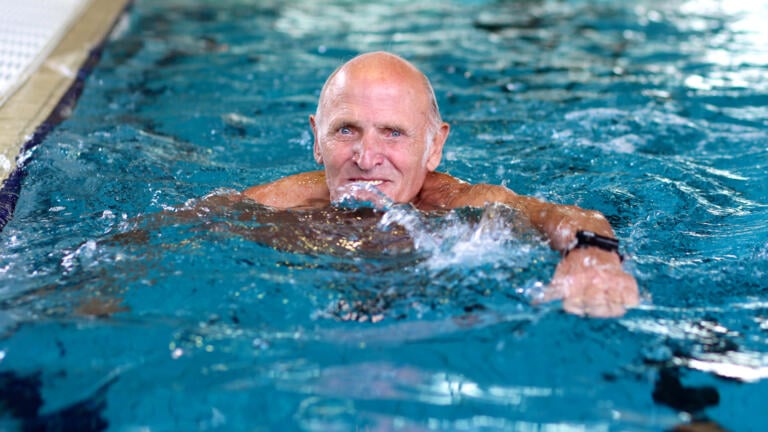
12 reasons why swimming is good for you
Julie Penfold
A new campaign seeks to encourage healthcare practitioners to recommend swimming to patients – here’s why
You might not expect your GP to prescribe swimming instead of the usual medicine script. Yet a regular swim could be just as beneficial to your health and wellbeing, according to a new campaign.
‘Swimming as Medicine’ is a new joint initiative from Swim England, the governing body for swimming in England, and the Royal College of General Practitioners (RCGP). Its aim is to encourage more healthcare professionals to consider recommending swimming and water-based activities to patients.
The benefits of swimming are numerous, ranging from relieving stress and anxiety to reducing the risk of chronic illnesses such as stroke and Type 2 diabetes. It can even improve life expectancy.
According to research from Swim England, swimming also presents less of a barrier to exercise, with one in three people prefering to swim over other types of exercise.
You might not expect your GP to prescribe swimming instead of the usual medicine script. Yet a regular swim could be just as beneficial to your health and wellbeing, according to a new campaign.
‘Swimming as Medicine’ is a new joint initiative from Swim England, the governing body for swimming in England, and the Royal College of General Practitioners (RCGP). Its aim is to encourage more healthcare professionals to consider recommending swimming and water-based activities to patients.
The benefits of swimming are numerous, ranging from relieving stress and anxiety to reducing the risk of chronic illnesses such as stroke and Type 2 diabetes. It can even improve life expectancy.
According to research from Swim England, swimming also presents less of a barrier to exercise, with one in three people prefering to swim over other types of exercise.
 Credit: Shutterstock/Hero Images Inc
Credit: Shutterstock/Hero Images Inc“Our Value of Swimming report highlighted that more than 14 million people swim at some point each year, making it one of the nation’s most popular forms of activity,” explains Andrew Power, water wellbeing specialist at Swim England.
“Yet in conversations with patients, some healthcare professionals find it easier to suggest walking,” Power says.
“But we know from our own research that one in three people with a long-term health condition or impairment would prefer to swim if given the choice.”
Swimming is both a non-weight bearing exercise and a relatively gentle form of full body exercise. That makes it suitable for many more of us, Power explains.
“Water has a unique ability to support those who may be hesitant to engage in other forms of physical activity, either due to lack of fitness, chronic pain, lack of balance, poor mobility or other barriers,” he says.
Social enterprise Better Leisure is the UK’s largest operator of swimming pools. It operates a number of GP-referral programmes that encourage people to swim regularly to help manage health issues.
“We work in partnership with Achieve Oxfordshire to offer a 12-week weight management programme called Swim 2 Slim,” explains Steve Beere, Health Intervention Manager for Better Leisure. “We section off two lanes of the pool for exclusive use for those on the programme. We also have a swim instructor available poolside to provide advice and guidance on how group members can improve their swim fitness.”
The results? “Over the course of the programme, we do see positive weight loss results – participants typically lose 3% to 5% of their weight.”
 Credit: Shutterstock / Ground Picture
Credit: Shutterstock / Ground PictureBetter Leisure also offers Healthwise swim sessions. These were introduced after Better’s health intervention team realised patients being referred to its broader scheme by their GPs were not all keen on land-based exercise options.
“We looked at how we could incorporate a pool-based exercise offer and we now run swim-based sessions with the help of funding from Swim England,” Beere explains. “We have an instructor poolside who is on hand to help participants with understanding the benefits of being active in water for health conditions such as arthritis, for example.”
Better Leisure has found that people who swim regularly through its GP referral programmes experience several benefits. These include improvements with their mobility, self-confidence, strength, balance and coordination.
“Swimming regularly helps people with their everyday activities,” adds Better’s Steve Beere. “It also helps them to build new social support networks and improves their quality of life.”
Darren Whitley, a patient of Leamington Spa GP Dr Hussain Al-Zubaidi, told his story in a video produced for the Swimming as Medicine initiative.
“At the end of February 2021, I ended up in intensive care for 45 days due to being very ill with Covid,” explains Darren. “I was put in an induced coma for 15 days and then following discharge, I had two readmissions from various infections. In post-recovery, I had real problems with my leg function, and I also had breathing issues. To try and address this, I started swimming.”
 Credit: Swim England
Credit: Swim EnglandDr Al-Zubaidi, who is RCGP’s lifestyle and physical activity clinical champion, first met Darren when he turned up at his local GP-led running group intent on addressing his health problems. Following a chat with Dr Al-Zubaidi, however, Darren opted to try swimming regularly instead.
“Swimming is good all-round exercise,” said Darren, “so if a doctor tells you to do something, that’s got huge value.”
Dr Al-Zubaidi has noticed improvements in Darren’s fitness and all-round health since he started swimming regularly.
“When I first met Darren, he was struggling to keep up even a gentle pace and he was getting quite breathless,” Dr Al-Zubaidi explains. “That was a combination of his baseline fitness and also that he was recently out of hospital, as he had been suffering with a respiratory infection as part of the complications he has experienced since having Covid.
“As he continued to swim, I could see how visibly different Darren was,” Dr Al-Zubaidi adds. “He was fitter, he looked younger and also more confident.”
Dr Deborah Lee, herself a keen swimmer, works at the Dr Fox Online Pharmacy and gave a warm welcome to the swimming initiative.
“Vast numbers of patients visit their GPs every day with symptoms such as joint pain, back pain, obesity, depression, anxiety and insomnia,” she explains.
“All of these are likely to be improved by doing aerobic exercise and what better way than swimming, with all its benefits? I think the initiative will be very helpful in getting the ‘swimming is good for you’ message across and encouraging more people to take the plunge.”
The main aim of Swimming as Medicine is to spread the word among healthcare professionals that swimming is good for everyone. Might it also inspire you to head to your local pool?
Swim England’s Poolfinder tool can help you find a pool or swimming club near you. You can also find the right support if you have particular swim needs. For example, dementia-friendly swimming or aquatic physiotherapy support in warm water hydrotherapy pools.
If you would like advice on swimming with specific health conditions, Swim England’s health and wellbeing hub is a great resource for dedicated information and useful tips.

Written by Julie Penfold she/her
Published: Updated:
Julie Penfold has been a specialist health and wellbeing journalist for more than 15 years and has been a finalist in three prestigious health and medical journalism awards during that time. She has written for a wide variety of health, medical, wellbeing and fitness magazines and websites. These have included Running, TechRadar, Outdoor Fitness, Be Healthy, Top Sante, Doctors.net.uk and The Guardian’s Social Care network.

Julie Penfold

Phillipa Cherryson

Phillipa Cherryson

Becky Fuller